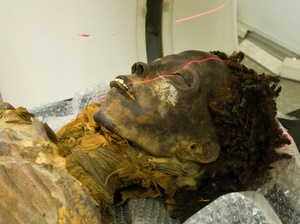 (NPR photo)
(NPR photo)
A few days ago, National Public Radio did a story on Egyptian mummies with heart disease. When the mummies guts were scanned using a CT machine, lo and behold, these ancient folks arteries were chock full of cholesterol and plaque.
According to Dr. Greg Thomas, who is one of the scientists that discovered these mummies, early Egyptians ate mostly fruits and vegetables, were active, did not use tobacco and ate very little meat. The fact that they developed heart disease given their diet and lifestyle threw Dr. Thomas for a loop. Befuddled, he stated that he feels current science must be missing a risk factor.
Well, risk factors are risk factors. Causes are causes. What we should be looking for are causes. Being human is a risk factor for death but it sure isn't the cause - ya know what I mean?
He also stated that a known cause of heart disease is dietary cholesterol.
Says Dr. Thomas:
Right now we know that high blood pressure, smoking, cholesterol, inactivity and other things cause athersosclerosis, but I think that we're less complete than we think.
Buzzer! Ding! Nope - we sure don't know that dietary cholesterol causes atherosclerosis (spelled incorrectly above by NPR). Just because you eat cholesterol doesn't mean it high tails it straight into the old pipes. (Dr. Oz does however.)
Think about it - every single cell in your body needs cholesterol to "live." Cholesterol is good - really good for us in fact. And you really can't eat too much of it. If you eat a lot of it, your body makes less. If you eat less, your body makes more.
So why might cholesterol get taxi cabbed into arterial walls and deposited there?
It seems that cholesterol gets deposited in our arteries when arteries become damaged in some way. Think of it as plaster on a cracked wall. If a wall gets a split or a crack in it, we put plaster on it to mend it. Your body does this too when it is damaged. But our bodies put the plaster in the inside of the wall and this forces the artery to become smaller in diameter as the damage and repair process continues.

But the plaster is not the villain - it's actually the hero. The villain is the thing that is causing the need for the plaster.
Unfortunately Dr. Thomas is, like so many other people including cardiologists, plagued by biases when it comes to heart/vascular disease. Dr. Thomas mentions that he and his co-workers were shocked when they saw that the mummies had atherosclerosis (hardening of the arteries). But because of their bias in favor of whole grains, fruits and vegetables and against meat, he can't see that if the Egyptians were indeed mainly vegetarians and active, eating cholesterol and meat can't be the culprit - then or now.
In fact, if we look at what we eat today (grains, vegetables, fruits and meat) and what the Egyptians ate then (exactly the same things but less meat), since they had ZERO access to junk food and tobacco, AND since they were more physically active, AND since they did not have environmental pollutants, the only thing we can conclude is that maybe, just maybe, grains, vegetables and fruits might indeed be the cause!
Capeesh? Yes? No?
Hear me out now - if your diet is rich in grains, fruits and veggies and low in fat and protein, your blood glucose level is chronically elevated. In fact, if the early Egyptians ate little meat, their blood sugar levels might have been even higher than ours on average. Chronically elevated blood glucose levels are very inflammatory and this can indeed be artery damaging. This is one of several papers that support this crazy idea.
Fat does not elevate blood sugar. Protein does an eensy bit if you eat a ton of it, but certainly no where near as much as grains, fruits and vegetables do.
Something to think about at least. Your thoughts?











